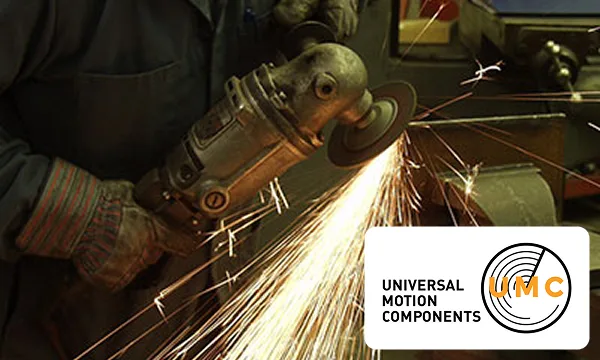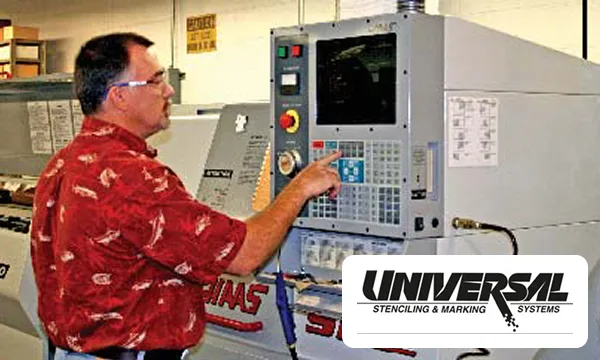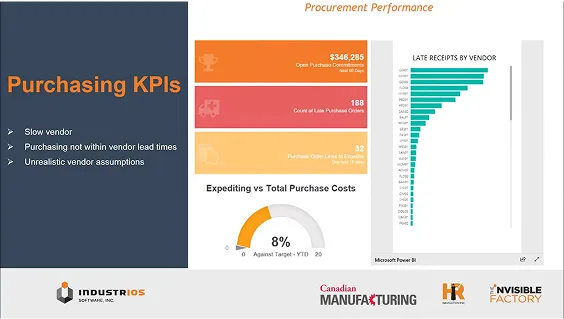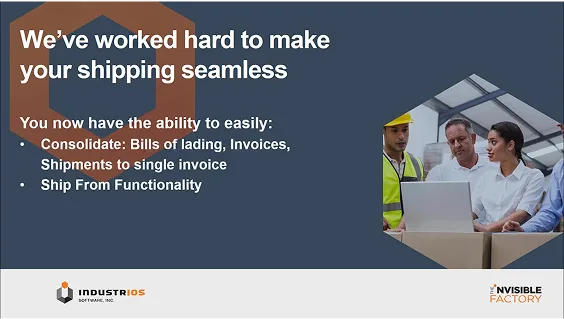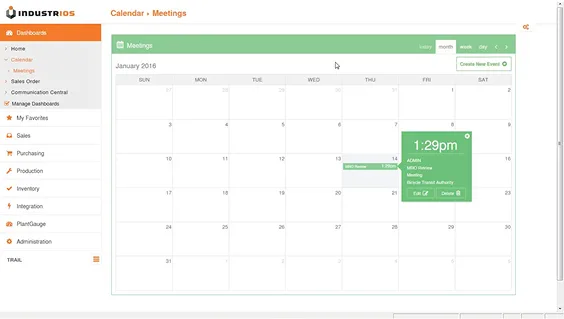Manufacturing Dashboards, Analytics, and KPIs: A Unified Approach for Business Intelligence in ERP
The guide explains how manufacturing dashboards, analytics, and KPIs in ERP systems provide business intelligence: dashboards show real-time data, analytics uncover patterns, and KPIs track progress toward strategic goals.

Manufacturing businesses always search for ways to improve efficiency and make smarter decisions. Enterprise Resource Planning (ERP) systems, when combined with manufacturing dashboards, analytics, and insights, can help achieve these goals. Let’s explore how these tools work together to benefit manufacturers.
The Building Blocks of Business Intelligence
Manufacturing dashboards, analytics, and insights are three interconnected components of business intelligence that work together to provide a comprehensive understanding of an organization’s performance. Let’s explore the differences between these elements:
Dashboards: The “What” of Business Data
Dashboards are visual displays that show key performance indicators in real-time (or near real-time). They transform complex data into easy-to-understand graphics, giving managers a quick snapshot of business operations. Dashboards primarily answer the “what” questions, such as:
- What is the current state of our business?
- What happened in our business recently?
- What trends are emerging?
Other Key Characteristics:
- Real-time or near real-time data
- Visual presentation of key metrics
- Focus on current performance or status
- Often used by various stakeholders (managers, executives, teams)
Dashboards are excellent for revealing the current state of affairs, exposing recent events, and disclosing trends in a business.
Example: A sales dashboard that shows metrics like total sales, sales by region, active customers, conversion rates, etc., all updated in real-time.
Analytics: The “Why” Behind the Data
Analytics go deeper, examining raw data to uncover trends and patterns that can lead to process improvements. While dashboards show what is happening, analytics answer the “why” behind the what.
Analytics involve:
- Digging deeper into the data
- Identifying causal factors and correlations
- Testing hypotheses and diagnosing problems forecasting, and predictive models
- Provides insights into why certain outcomes occur
- May involve complex queries and data mining
For example, analytics might help answer questions like “Why did sales suddenly fall or increase?” or “What are the solid business outcomes when users search our site?”
KPIs (Key Performance Indicators): Actionable Conclusions
KPIs are specific, measurable metrics used to evaluate an organization’s success or progress toward its strategic objectives. They are key performance indicators focusing on quantifiable outcomes aligned with business goals.
They guide understanding how well the company or team is performing relative to its strategic objectives. Also, they are often tied to a company’s vision and are used to set targets and track progress toward achieving business goals.
Key Characteristics:
- Discovering patterns in data
- Identifying relationships between variables
- Generating “aha moments” that drive business decisions
- Tied to business goals and objectives
- Provide a clear performance benchmark
- It can be lagging (historical) or leading (predictive)
Data is collected and organized, analytics are performed on this data, and insights are generated.
Example: A company might have KPIs such as revenue growth, customer satisfaction scores, and employee turnover.
Why These Tools Matter for Manufacturers
When integrated into an ERP system, these tools offer significant advantages. Real-time (or near real-time) dashboards allow plant managers to monitor production processes as they happen, receive immediate alerts about potential problems, and take quick corrective actions to minimize downtime. This instant awareness is essential in modern manufacturing.
Data-driven decision-making helps manufacturers predict demand patterns more accurately, manage inventory better, and adjust production schedules proactively. This approach reduces the likelihood of stockouts and excess inventory, leading to more efficient operations.
Comprehensive performance tracking enables businesses to spot inefficiencies early, monitor production throughput, and evaluate worker productivity. By analyzing metrics like lead times and defect rates, manufacturers can identify areas for improvement and take targeted action.
Cost optimization is another key benefit. Advanced analytics help manufacturers find opportunities to save money by analyzing production expenses, improving worker efficiency, and streamlining purchasing processes. This data can also support more effective negotiations with suppliers.
The Strength of Integration
When manufacturing dashboards, analytics, and insights work together seamlessly, manufacturers gain a powerful tool for operational intelligence. A unified ERP platform offers several key benefits:
- Unified Data Management: Ensures all departments work with consistent, up-to-date information
- Eliminates Data Silos: Breaks down information barriers between different parts of the organization
- Single Source of Truth: Provides a reliable, centralized information hub for decision-makers
Integrated systems dramatically improve organizational collaboration through:
- Enhanced Communication: Teams can easily share insights across departments
- Aligned Objectives: Helps different groups work towards common organizational goals
- Improved Problem-Solving: Creates a more cohesive approach to addressing challenges
Advanced ERP systems leverage artificial intelligence and machine learning to deliver predictive capabilities:
- Demand Forecasting: Accurately anticipate market changes and customer needs
- Proactive Maintenance: Predict equipment maintenance requirements before breakdowns occur
- Production Optimization: Automatically adjust production schedules for maximum efficiency
- Risk Mitigation: Identify and address potential operational challenges before they disrupt business
This comprehensive approach transforms raw data into a strategic asset, enabling manufacturers to make more informed decisions, reduce operational risks, and maintain smoother, more efficient business processes.
Best Practices for Implementation
Manufacturers should follow key practices to get the most out of an ERP system with integrated dashboards, analytics, and insights. First, defining clear, measurable goals for what you want to achieve with these tools is important. Customizing dashboards for different users ensures each team member can access the information most relevant to their role.
Investing in thorough team training is crucial for successful implementation. When employees understand how to use these tools effectively, they’re more likely to embrace them and use them to their full potential. Regular review and improvement of analytical models help ensure that the insights generated remain relevant and valuable as business conditions change.
The Future of Manufacturing Intelligence
New technologies are shaping the future of manufacturing intelligence. The Internet of Things (IoT), artificial intelligence, and machine learning are opening up new data collection and analysis possibilities. Manufacturers who adopt these advanced analytical tools will be better equipped to handle complex market conditions and stay ahead of the competition.
INDUSTRIOS is one company that’s leading the way in this field. Their ERP Manufacturing Suite includes a Manufacturing Intelligence Dashboard that turns large amounts of data into actionable knowledge. This tool demonstrates how a unified approach to business intelligence can drive results and improve collaboration across an organization.
Final Thoughts
The manufacturing industry is becoming increasingly data-driven. By embracing dashboards, analytics, and insights as part of a unified ERP system, manufacturers can improve their operations, make better decisions, and position themselves for long-term success. As the industry evolves, those leveraging these tools will be best positioned to thrive in a complex and competitive marketplace.
[Request a Demo]







